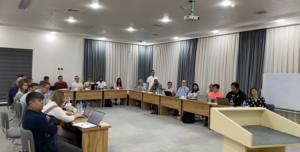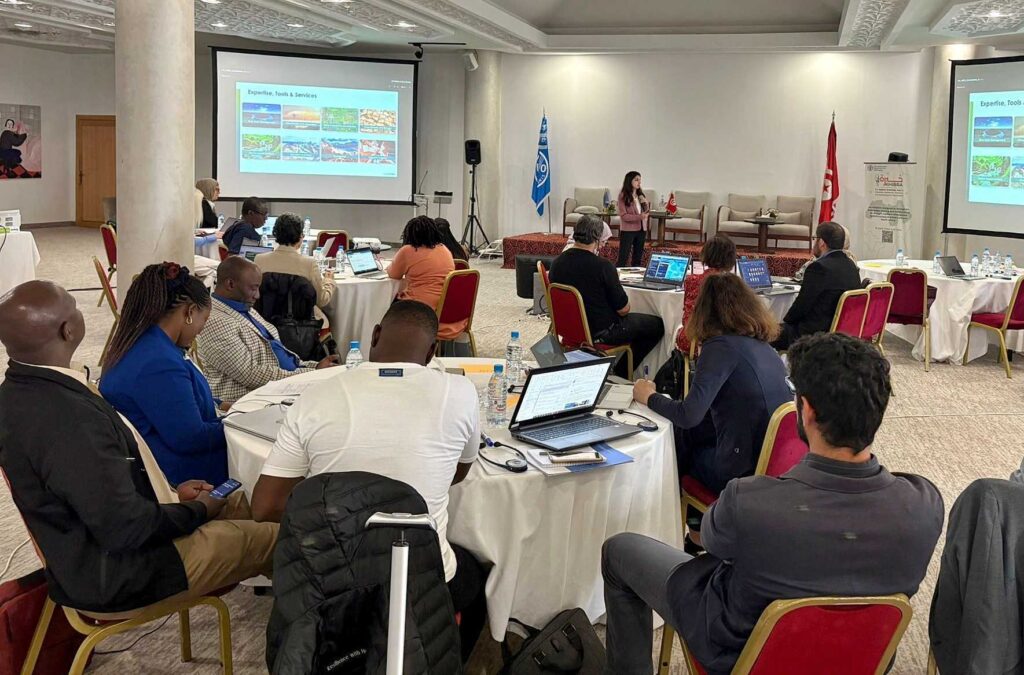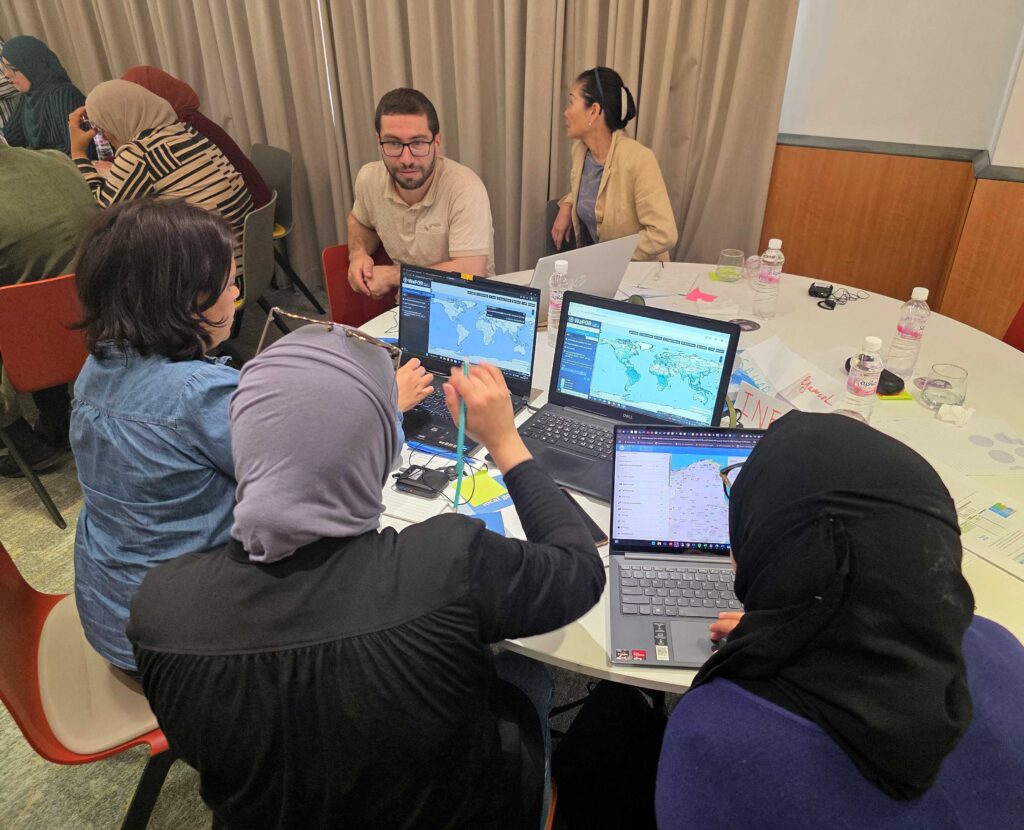El objetivo del proyecto es reforzar la capacidad del Ministerio de Agricultura, Recursos Hídricos y Pesca de Túnez en la gestión integrada del agua, la energía, los alimentos y el medio ambiente (WEFE) para promover un desarrollo sostenible y resistente al clima. A través del Programa Shiraka, las partes interesadas reciben formación para analizar los flujos de agua, las compensaciones sectoriales y las sinergias utilizando herramientas como REWAS (Real Water Savings in Agricultural Systems), Follow the Water y REWEFe (Rapid Evaluation of Water-Energy-Food-ecosystem nexus) desarrolladas por FutureWater en colaboración con la FAO y otros socios. Las sesiones de formación combinan ejercicios prácticos, aplicaciones de datos de teledetección y debates participativos para mejorar la toma de decisiones basada en datos y la coordinación institucional a la luz de la escasez de agua y el cambio climático.
FutureWater, junto con la oficina regional de la FAO para Oriente Medio y Norte de África, presentó el anteproyecto de una nueva herramienta de apoyo a la toma de decisiones en el taller interregional de la FAO sobre «Enfoques integrados y buenas prácticas basadas en pruebas en la gestión sostenible de la tierra para promover la integración del nexo WEFE». La herramienta está diseñada para utilizar datos de contabilidad hídrica para evaluar y equilibrar el uso sectorial y la demanda de recursos dentro del nexo agua-energía-alimentación-ecosistema (WEFE).
Al taller, organizado por la Plataforma Técnica Interregional sobre la Escasez de Agua (iRTP) de la FAO, asistieron expertos de Oriente Medio y Norte de África y del África subsahariana, como Yemen, Malawi, Egipto, Jordania, Argelia, Marruecos, Túnez, Botsuana, Zimbabue y Tanzania. Esta diversa reunión creó un valioso espacio para el intercambio interregional sobre las mejores prácticas en la gestión sostenible de la tierra y el agua.
La presentación de FutureWater puso de relieve cómo la herramienta, actualmente en desarrollo, pretende apoyar la planificación basada en pruebas y la asignación de recursos en sectores que compiten entre sí. La nueva iniciativa se basa en trabajos anteriores del Programa de la FAO sobre la escasez de agua en Asia y el Pacífico y aporta un enfoque sistémico a la gestión integrada de los recursos.
Fue especialmente alentador recibir un gran interés de varios países por probar la herramienta, lo que refuerza la urgente necesidad de soluciones escalables y basadas en datos que puedan apoyar el desarrollo sostenible en regiones con escasez de agua.
FutureWater se enorgullece de contribuir a la promoción de enfoques integrados para la gestión de la tierra y el agua y espera con interés las próximas etapas de desarrollo y pruebas piloto.
FutureWater ha impartido con éxito la segunda parte del programa de formación Shiraka sobre «Agua Climáticamente Inteligente en la Agricultura», en colaboración con la Academia de La Haya para la Gobernanza Local. La formación formaba parte del Programa Shiraka, una iniciativa del Ministerio de Asuntos Exteriores de los Países Bajos destinada a reforzar las asociaciones sostenibles y el intercambio de conocimientos con los países de Oriente Medio y Norte de África.
El programa adoptó un enfoque práctico, centrándose en aplicaciones y herramientas del mundo real relevantes para el contexto agrícola tunecino. Los participantes, procedentes del Ministerio de Agricultura, Recursos Hídricos y Pesca, participaron en sesiones interactivas en las que se utilizaron estudios de casos que ayudaron a crear capacidades sobre cómo cuantificar y gestionar eficazmente los recursos hídricos en un clima cambiante.
Se presentaron herramientas clave como REWAS y Follow the Water (desarrolladas en colaboración con la FAO) para analizar los flujos de agua en los sistemas agrícolas. Para hacer frente a los retos que plantean los datos, los participantes también trabajaron con conjuntos de datos de teledetección y aprendieron a acceder a la información y procesarla utilizando plataformas como WaPOR, el portal de la FAO para la productividad del agua a través del acceso abierto a datos de teledetección teledetección.
La formación hizo hincapié en la importancia de los enfoques basados en datos y las herramientas inteligentes para apoyar la toma de decisiones en la gestión del agua, especialmente en condiciones de variabilidad climática y escasez de agua condiciones de variabilidad climática y escasez de agua. El éxito de este programa pone de relieve el compromiso constante de FutureWater con la capacitación y las soluciones innovadoras para una gestión del agua en la agricultura resistente al clima
La Plataforma Técnica Interregional sobre Escasez de Agua (iRTP-WS), liderada por la Organización de las Naciones Unidas para la Alimentación y la Agricultura (FAO), busca cerrar brechas entre la práctica y la innovación para impulsar un cambio transformador en la gestión del agua, la tierra y la agricultura, especialmente ante el cambio climático. Su enfoque está en fortalecer la preparación de los sistemas para afrontar desafíos relacionados con el agua, la alimentación y el clima mediante una mejor gobernanza, desarrollo de capacidades y aprendizaje en línea.
Para 2024-2025, el plan de trabajo se centra en «Soluciones Integradas para el Agua: Navegando el Cambio Climático y la Dinámica del Nexo Agua-Energía-Alimentos-Ecosistemas (WEFE)». La Oficina Regional de la FAO para Asia y el Pacífico lidera la Prioridad Estratégica 1: Pensamiento Nexus, promoviendo una toma de decisiones inclusiva y multisectorial para optimizar el uso de los recursos e implementar soluciones sostenibles basadas en WEFE.
Para respaldar la toma de decisiones basada en el enfoque nexus, la FAO, en colaboración con FutureWater, está desarrollando una herramienta que aprovecha los datos de Water Accounting para proporcionar información accesible sobre la dinámica de WEFE. Esta herramienta integrará WEAP y su API en un entorno de Excel, facilitando el análisis de escenarios tanto para proyecciones como para intervenciones. Al combinar las fortalezas de ambas plataformas, ofrecerá un enfoque intuitivo, estandarizado y colaborativo de Water Accounting, contribuyendo a un marco de toma de decisiones más armonizado.
A consortium of international development finance institutions led by World bank and including Asian Development Bank (ADB) have signaled their intention to support the financing of the Project. ADB is committed under Strategy 2030 operating priority 3 to support its Developing Member Countries to ensure a comprehensive approach to build climate and disaster resilience. The climate risk management approach of the ADB aims to reduce risks resulting from climate change to investment projects by identifying climate change risks to project performance in the early stages of project development, and which will support decision-making to incorporate the most appropriate adaptation measures in the design.
An initial climate risk assessment has been completed for the Rogun HPP project including assessments of natural hazards, hydrology, sedimentation, and the impact of climate change projections on project performance, however downstream resource implications have not been assessed. In this project FutureWater addresses wider system-level adaptation needs across the Amu Darya basin due to increased water use demand during the Rogun HPP reservoir filling period, climate-driven change to water supply and demand, and identification of potential supply-demand gaps. A combination of hydrological and water allocation modeling will form an evidence-base to inform recommended adaptive measures for the design and operation of Rogun HPP and for wider water-use sectors where required.
FutureWater undertakes analysis to understand projected climate change driven changes in water supply in Rogun HPP upstream areas, and water demands in downstream areas and the wider Amu Darya basin, with a focus on identifying the potential for a supply-demand gap throughout the Rogun HPP reservoir filling period to 2040. Where a risk of a supply-demand gap is identified FutureWater provides recommended measures that can increase water efficiency in the competing demand use sectors with the overall aim of meeting demand across the different scenarios and in compliance with cross-boundary resource sharing agreements.
Specifically, FutureWater addresses following topics:
- Model projected water supply and demand in the Amu Darya river basin by utilizing a WEAP model developed for water supply, demand and allocation analysis, and accounting for climate change, Rogun HPP reservoir filling schedule, changing hydrology patterns and changes to downstream water demand from irrigation and other relevant end-use demands, where relevant.
- Analyze the potential for water resource supply-demand gap to 2040 for a range of climate scenarios that capture potential future pathways aligned to government plans and policies and climate change, where relevant.
- Recommend required water efficiency measures, where a risk of a supply-demand gap is identified under the the limits set by the cross-border water resource sharing agreement, so as to mitgate the risk with high-level cost estimate where capital investment is required.
FutureWater impartió recientemente una sesión de formación para el Ministerio de Agricultura, Recursos Hídricos y Pesca de Túnez sobre la gobernanza del agua y el nexo agua-energía-alimentación-medio ambiente (WEFe). Esta formación, celebrada en Túnez, formaba parte del programa de formación Shiraka, financiado por los Países Bajos, y se impartió en colaboración con la Academia de Gobernanza Local de La Haya. El objetivo de la sesión era dotar a las partes interesadas de los conocimientos y herramientas necesarios para aplicar estrategias de gestión integrada de los recursos ante los crecientes retos hídricos y climáticos.
Un componente clave de la formación fue la herramienta de evaluación rápida para el análisis de los nexos del FME (REWEFe), desarrollada para apoyar la toma de decisiones mediante la evaluación de las compensaciones y sinergias entre los sectores del agua, la energía, la alimentación y el medio ambiente. La formación proporcionó una demostración en profundidad de la herramienta REWEFe, mostrando su aplicación práctica a través de estudios de casos relevantes para el contexto de Túnez. Los participantes estudiaron cómo la herramienta puede ayudar a los responsables políticos y a los gestores del agua a priorizar las intervenciones sostenibles y mejorar la asignación de recursos.
Las sesiones interactivas fomentaron el debate sobre los marcos de gobernanza, la coordinación institucional y las necesidades de creación de capacidad para incorporar el enfoque del nexo del FME en Túnez. Al tender puentes entre la ciencia, la política y la práctica, la formación pretendía mejorar la capacidad del Ministerio para desarrollar estrategias de gestión del agua resilientes y adaptables.
Esta iniciativa forma parte del compromiso continuo de FutureWater de apoyar la gobernanza sostenible del agua en Oriente Medio y Norte de África y más allá, fortaleciendo la experiencia local en la gestión integrada de los recursos y la adaptación al clima.
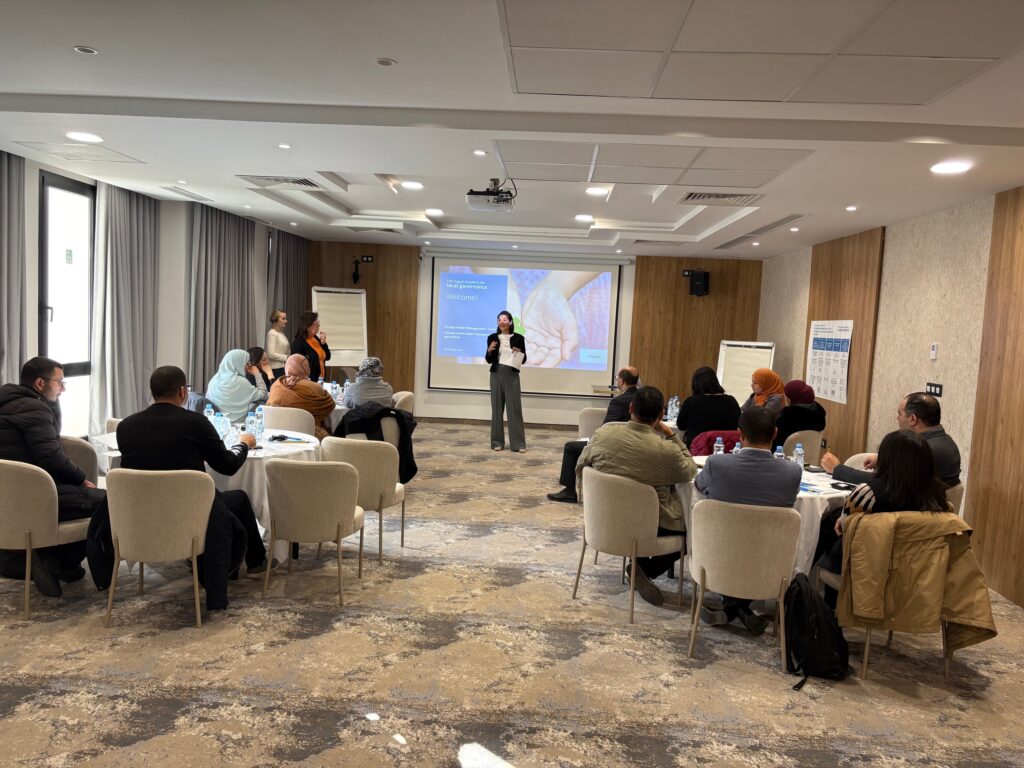
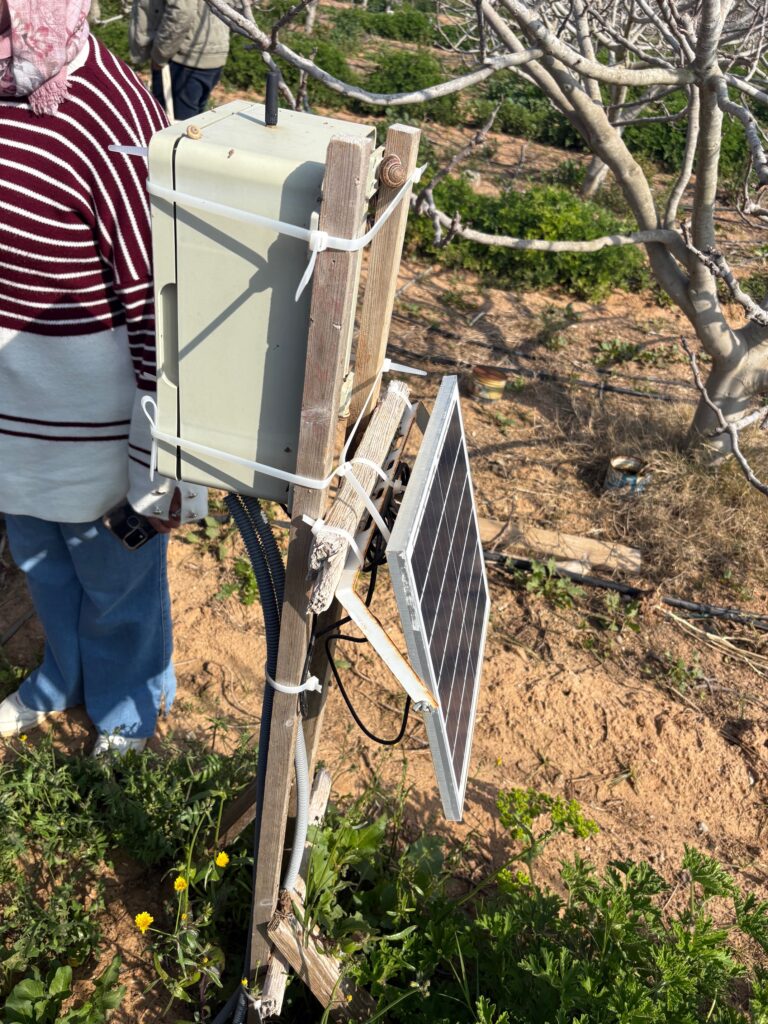
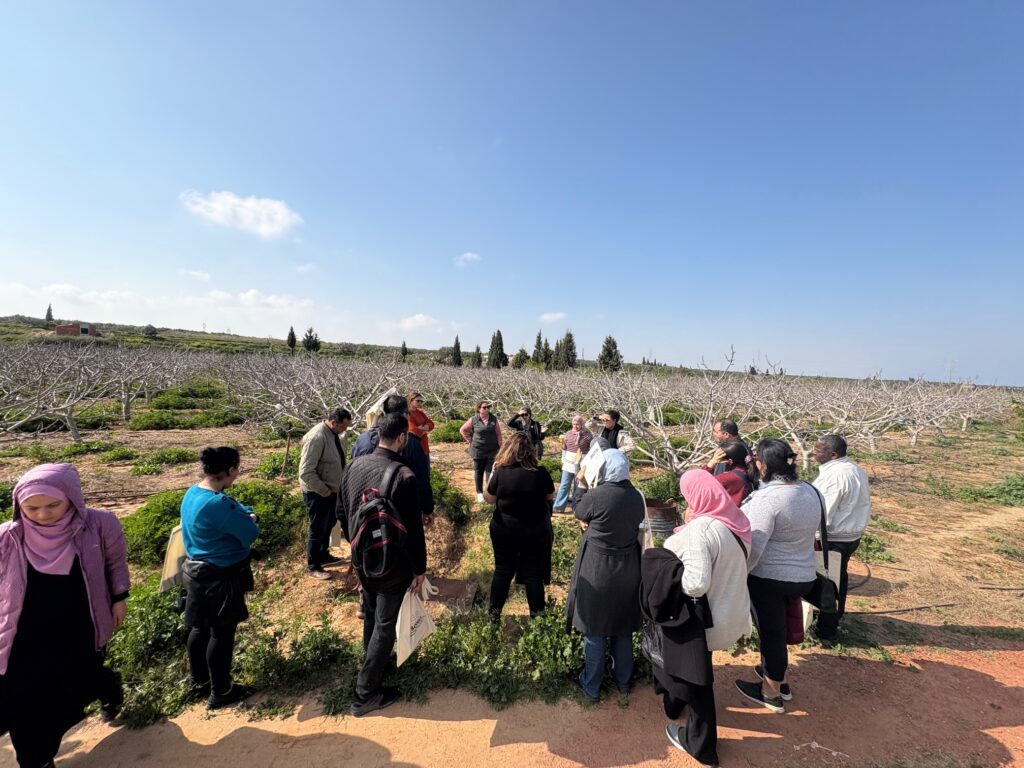
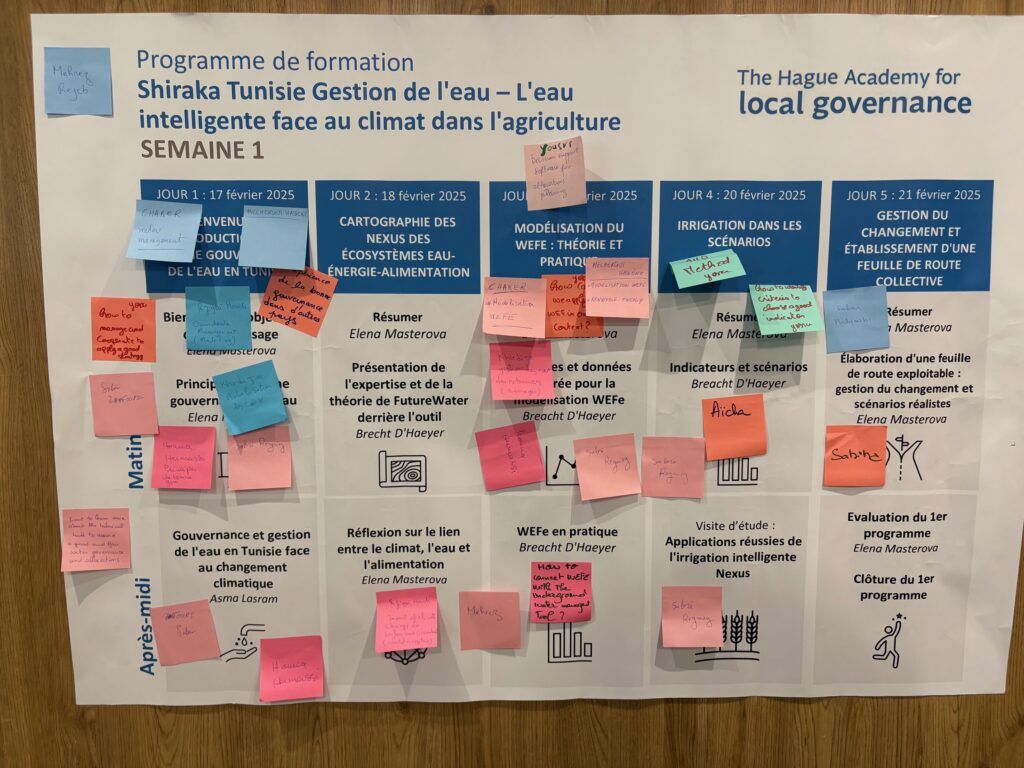
In the WE-ACT project at FutureWater, significant advancements are being made to improve climate-sensitive water allocation across the Syr Darya River Basin. This region faces complex challenges, including transboundary water issues and increasing climate impacts on water resources, which the project consortium addresses through advanced water modeling and decision-support tools. A key focus of the work is enhancing the Water Evaluation and Planning (WEAP) model, a foundational component of the Decision Support System (DSS) being developed for the region’s water management.
The project involves gathering, analyzing, and integrating socio-economic and water demand data into the WEAP model. Demand scenarios are being created and analyzed to understand how factors such as population growth, agricultural expansion, changing energy demand, and industrial needs shape future water use. Regionally specific socio-economic scenarios are also being developed to reflect the local context, enabling the modeling of diverse future pathways for the Syr Darya Basin. This work ensures that the model responds not only to environmental factors but also to socio-economic pressures unique to the region.
Data review and integration are systematically conducted, focusing on validating and implementing hydro-meteorological, socio-economic, and climate projection datasets. This rigorous approach ensures the accuracy and reliability of the WEAP model, supporting its role in generating outputs that inform sustainable water allocation strategies. Accurate data analysis is critical for tailoring the model to the basin’s needs and aligning with the project’s goal of addressing climate change impacts on water resources.
These efforts contribute to the WE-ACT project’s broader mission of building adaptive and sustainable water management solutions for Central Asia. The next steps in the project focus on calculating and analyzing water demand and water footprints of different users within the Syr Darya River Basin. This work evaluates the effects of water allocation on unmet water demand, environmental flow violations, and the overall sustainability of water use in the region.
The Rogun HPP is a project that will have a large reservoir capable of providing seasonal regulation. It will supply firm energy during the winter months when demand for electricity is the highest in Tajikistan and will allow for exports of clean electricity to the Central Asia (CA) region and beyond. The Project could play the role of a balancing plant for Tajikistan and the broader Central Asia region to help integrate significant new solar PV and wind generation capacity into the network.
The Rogun HPP was initially designed in the 1970s as part of the development of the Vakhsh River cascade for integrated economic development in the Central Asian republics of the Soviet Union. Construction of Rogun HPP began in 1982 and was then interrupted by political changes resulting from the independence of Tajikistan and the other Central Asia countries. The World Bank in 2011 provided funding to the Government of Tajikistan to conduct a Technical and Economic Assessment Study and an Environmental and Social Impact Assessment. The Government of Tajikistan proceeded with construction without development partners’ involvement. In 2023 a technical assistance grant was approved by World Bank to improve the financial and commercial frameworks of the Rogun HPP Project and to enhance its technical, environmental and social sustainability.
ADB is committed under Strategy 2030 operating priority 3 to support its Developing Member Countries to ensure a comprehensive approach to build climate and disaster resilience. The climate risk management approach of the ADB aims to reduce risks resulting from climate change to investment projects by identifying climate change risks to project performance in the early stages of project development and incorporating adaptation measures in the design.
FutureWater will undertake a climate risk and vulnerability assessment for the Rogun HPP project. Technical studies assessing Rogun HPP’s exposure to natural hazards, hydrology, sedimentation, and
the impact of climate change projections have been completed. These findings are incorporated into the detailed technical design of the project. FutureWater will review all existing studies and any
related studies from reputable sources and consolidate the findings into a climate risk and vulnerability assessment (CRVA) for the project. FutureWater will ensure the methodological approach and technical rigor of the existing evidence base is sufficient, flagging potential insufficiencies which may have a material impact on the conclusions of the assessments. Related tasks to support due diligence will also include a Paris Alignment Assessment in accordance with ADB guidelines, a climate financing accounting estimate, a lifecycle greenhouse gas emission estimate, and Climate Change Assessment summarizing the CRVA findings.
FutureWater, in collaboration with FAO Pakistan, has been implementing a hands-on training on Water Accounting under the GCF project titled “Transforming the Indus Basin with Climate Resilient Agriculture and Water Management”. Comprising of 7 modules, the capacity building program has been running since December 2023, with both online and in-country training sessions.
The latest in-country session took place from 10th-15th June at the FAO office in Islamabad where 35 participants from both Punjab and Sindh provinces successfully completed Module 5 and Module 6. Module 5 focused on the development of WEAP models for the seven respective spatial scales while the aim of Module 6 was to build and assess different socioeconomic and climate change scenarios. Participants understood the key differences between projections and interventions, and learned how to extract and pre-process climate projections data for generating different SSPs scenarios in WEAP. Similarly, the multidisciplinary groups were able to analyse the gaps between supply and demand based on the initial model results.
The next module, which is also the last module of the training program, will enable participants to translate the scientific findings into policy action through the development of different knowledge products i.e. infographics and policy briefs. The knowledge products will mainly be designed for decision makers and farmers and will serve as evidence for informed decision making and equitable use of water resources under different constraints. This training will mark the completion of the first round of water accounting which will be subject to improvement based on the in-situ monitoring equipment being installed under this project.
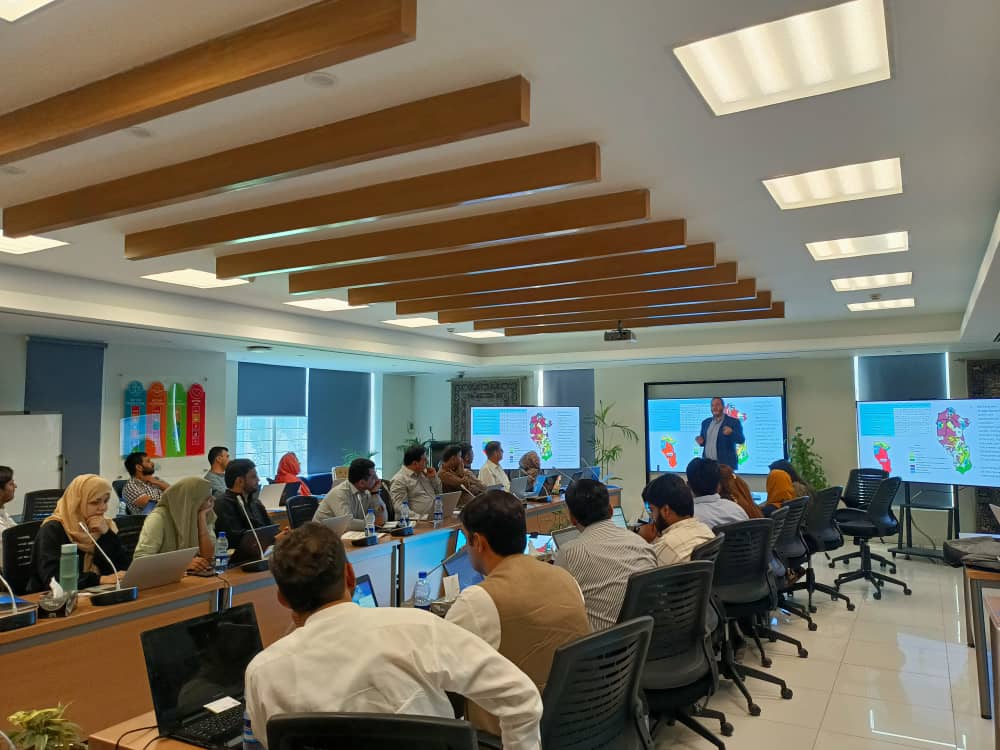
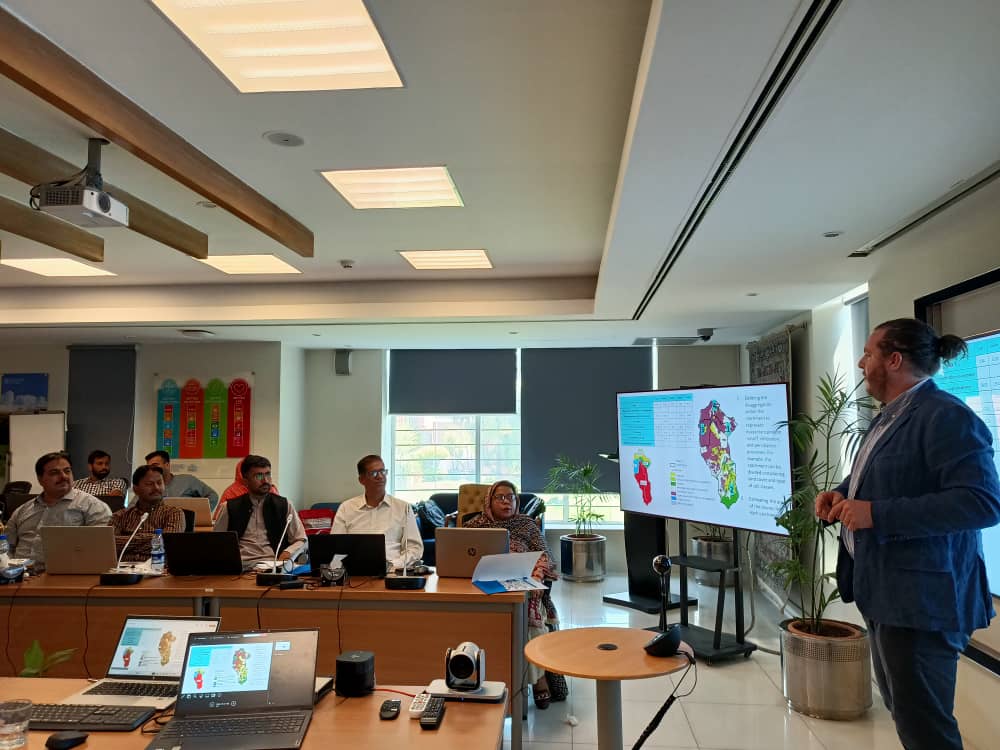
The WE-ACT General Assembly, held in Tashkent, Uzbekistan from April 23rd to 24th, 2024 focused on advancing water management in Central Asia through keynote speeches, collaborative sessions, and innovative demonstrations. Notable moments include the introduction of serious games for interactive learning and decision making, and a visit from BWO SyrDarya and SIC ICWC, emphasizing the importance of end-user engagement. Overall, the assembly exemplifies collective efforts towards sustainable water allocation in the region.
The WE-ACT General Assembly served as a medium for WE-ACT partners to share important project information. Organized by the International Water Management Institute (IWMI), in collaboration with the WE-ACT Consortium Partners and regional as well as national partners, the assembly focused on addressing key challenges and fostering collaboration in the region.
The assembly commenced with a welcome address from the project coordinator and local organizer, emphasizing the importance of collective action in addressing water-related issues.
The first keynote speaker, Dr. Tobias Siegfried from HydroSolutions, delivered a speech on hydrological forecasts and integrated water resources management in Central Asia, providing insights into Data Sharing of Hydro-Climate Information in Central Asia, and the digital assistant for operational hydrology (iEasyHydro HF), SnowMapper Central Asia, and opportunities for forecast service improvements in the region.
The session was followed by sister project Transcend and Dr Dionisio Pérez from USAL, highlighting the interconnectedness of initiatives aimed at holistic water management.
Dr. Thomas Ammerl (BayFOR) shed light on European research and innovation funding in green topics, emphasizing the significance of international partnerships, and the opportunities within the EU funds.
The assembly facilitated engagement and collaboration through participatory activities, including discussions on end-user needs and the alignment of DSS (Decision Support System) scenarios with WE-ACT partner capabilities. Mock-ups of DSS software tools offered tangible insights into ongoing developments, while discussions on regional data and model platforms helped in future technology advancements.
A panel discussion led by BayFOR provided a platform for sharing experiences on project management and EU reporting, offering valuable insights for WE-ACT partners and the upcoming reporting period.
Among a series of collaborative sessions, the visit from BWO SyrDarya and SIC ICWC was a standout moment during the WE-ACT General Assembly. Representatives from these prominent organizations took advantage of the chance to clarify their stakeholder and end-user needs and ambitions, providing light on how our collective solutions could be tailored to fit their individual requirements. They provided significant insights on potential ways to incorporate Decision Support System (DSS) technologies into their operational frameworks by delving into the subtleties of water management within their various domains.
The highlight of the WE-ACT General Assembly was the initial testing of serious game. This provided partners with a unique opportunity to experience the role of decision-makers and navigate complex water management scenarios across various sectors. The serious game was designed with a specific goal in mind: to explore avenues for valuing water and fostering a deeper understanding of its intrinsic worth.
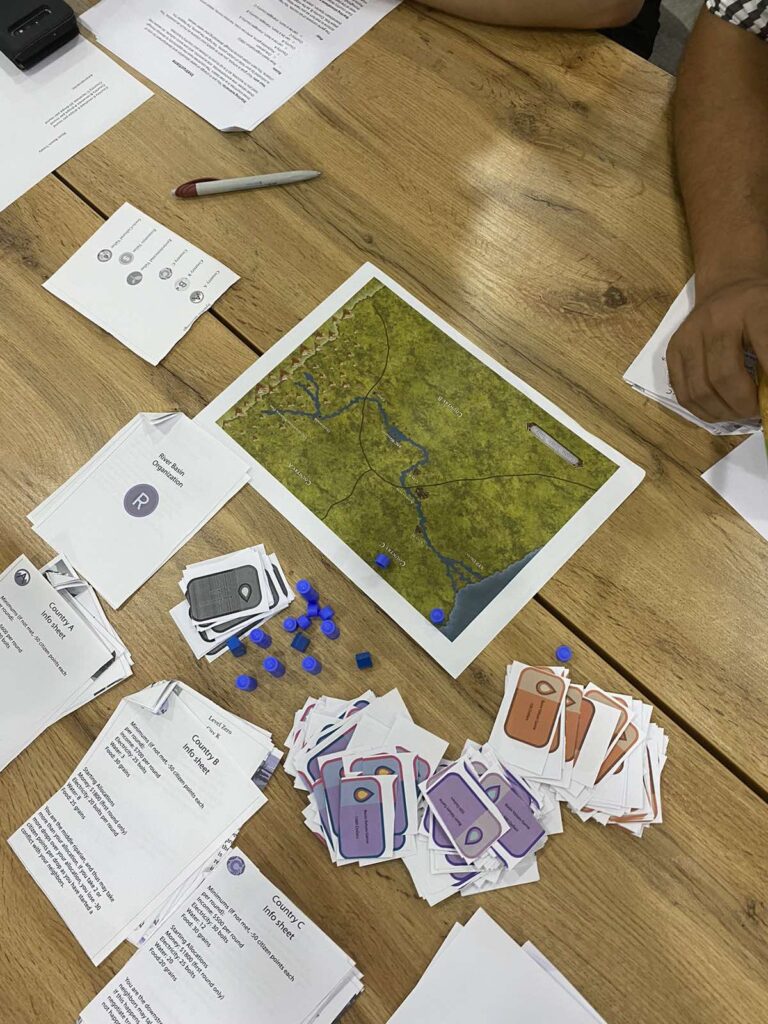
Participants engaged in interactive gameplay where they faced simulated challenges and dilemmas mirroring real-world scenarios. From allocating water resources among competing sectors to implementing conservation measures in the face of environmental pressures, the game was a dynamic approach for decision-making and strategic thinking.
In conclusion, the WE-ACT GA served as a forum for knowledge exchange, collaboration, and strategic planning to address water management challenges in Central Asia.
